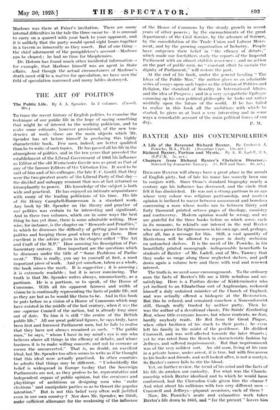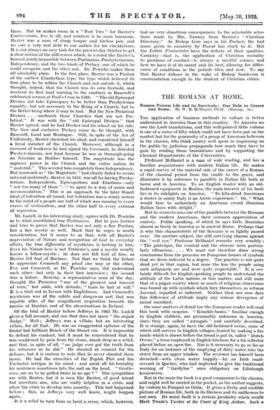BAXTER AND HIS CONTEMPORARIES ,
Richard Baxter, Puritan and Mystic. By A. H. Ladell, (S.P.C.K. 5s. net.) Chapters from Richard Baxter's Chrlstien Directori."
Selected by Jeannette Tawney. (G. Bell and Sons. 6s. net.) RICHARD BAXTER will always have a great place in the annals of English piety, but of late his name has scarcely been one to conjure with. Since Orme's standard biography nearly a century. ago his influence has decreased, and the circle that felt it has diminished. lie was not a strong partisan in an age whose very colour was religious partisanship, and modern opinion is inclined to waver between amusement and boredom concerning a man whose works ran to between thirty and forty thousand printed octavo pages of theology, casuistry and controversy. Modern opinion would be wrong, and we are grateful for the three books before us which serve, each in its measure, to rekindle our interest in the real Baxter who was a power for righteousness in his own age, and, perhaps, after all, has a message for this. Still, a vast quantity of Baxteriana will be allowed to repose in dusty seclusion on untouched shelves. It is the merit of Dr. Powieke, in his beautifully printed monograph—indispensable henceforth to students of Baxter—of Mr. Ladell, and of Mrs. Tawney that they make us range along those neglected shelves, and pull • down again a volume here and there with real and renewed
interest. • The truth is, we need some encouragement. To the ordinary n
man the facts of Baxter's life are a little nebulous and un- satisfying. Here is a Puritan divine of Kidderminster who yet inclined to an Elizabethan sort of Anglicanism, reckoned himself a duly ordained minister of the Church of England, and was actually offered a bishopric at the Restoration. But this he refused, and remained somehow a Nonconformist still, though really -trusted by neither party. Then he was the author of a devotional classic, The Saints' Everlasting Rest, whose title everyone knows, but whose contents, we fear, hardly anybody reads. He fled from the Great Plague, when other brethren of his stuck to their posts ; he even left his family in the midst of the pestilence. He disliked Cromwell, and was well affected towards the later Stuarts ; yet lie was rated from the Bench in characteristic fashion by Jeffreys, and suffered imprisonment. But that imprisonment was of the very mildest sort. An old man, living at his ease in a private house, under arrest, it is true, but with free access to his books and friends, and well looked after, is not a martyr. So Baxter's career fails to stir the blood.
Yet, on further review, the trend of his mind and the facts of his life do awaken our curiosity. For what was the Church- manship which Baxter idealized and to which he would have conformed, had the Clarendon Code given him the chance ? And what about his collisions with two very different men— Cromwell and Jeffreys—piquant occasions, each of them ?
Now, Dr. Powicke's acute and exhaustive work takes Baxter's life doWn to 1663, and " for the present " leaves him
there. But he makes room in a " Part Two " for Baxter's Controversies, five in all, and nowhere is he more luminous. Baxter was a man of sharp tongue and tireless pen, and we owe a very real debt to our author for his elucidations. It is not always an easy task for the present-day thinker to get a clear notion of the differences which, to a mind like Baxter's, loomed nearlyimpassible between Puritanism, Presbyterianism, Independency, and the two kinds of Prelacy, one of which he could recognize and the other not. Dr. Powicke makes them all admirably plain. In the first place, Baxter was a Puritan of the earliest Elizabethan type, the type which believed its true place to be within the Church and not outside it, which thought, indeed, that the Church was its own freehold, and received its first loud warning to the contrary in Bancroft's celebrated sermon at Paul's Cross in 1588. " The old Episcopal Divines did take Episcopacy to be better than Presbyterian equality, but not necessary to the Being of a Church, but to the Better being where it may be had. But the New Prelatical Divines . . . unchurch those Churches that are not Pre- latical." It was with the " old Episcopal Divines " that Baxter agreed, and he had Hooker and his school on his side. The New and exclusive Prelacy came in, he thought, with Bancroft, Laud and Montague. Still, in spite of the Act of Uniformity, Baxter cherished his ideal, and considered himself a loyal member of the Church. Moreover, although in a moment of weakness he had signed the Covenant, he detested Presbyterianism, not least because he was as thorough-going an Erastian as Hobbes himself. The magistrate was the supreme power in the Church and the entire nation its " material." This severed him completely from Independency. But inasmuch as " the Magistrate " had clearly failed to secure national uniformity, Baxter, in 1651, was all for having Presby- terians, Independents, Episcopalians and Erastians—only " not too many of them "—" to agree to a way of union and accommodation." This is an approach to the later Stuart ideal of toleration all round, but toleration was a windy notion to the mind of a people one half of which was running to every excess of sectionalism, and the other half to every extreme of repression.
Mr. Ladell, in his interesting study, agrees with Dr. Powicke as to what constituted true Puritanism. But he goes further and tries to prove that Baxter was not only a fine Puritan, but a fine mystic as well. Much that he urges is worth consideration, but it seems to us that, with all Baxter's appreciation of Nature and recognition of God in everyday affairs, the true differentia of mysticism is lacking in him. Even his Nature-love is not Traheme's, and a mystic usually knows a fellow-mystic ; he does not fall foul of him, as Baxter fell foul of Boehme. Not that we think the failure to appreciate Cromwell any proof one way or the other, Fox and Cromwell, as Dr. Powicke says, did understand each other—but only in their first interview ; the second was a failure. Reresby, a representative man of the day, thought the Protector " one of the greatest and bravest of men," but adds, with distaste, " tears he had at will." It is a trait not in favour with Englishmen. And Cromwell's Mysticism was of the subtle and dangerous sort that was capable alike of the magnificent inspiration beneath the sunrise at Dunbar, and of the abominations in Ireland.
Of the trial of Baxter before Jeffreys in 1685 Mr. Ladell gives a full account, and one that does not spare " the unjust Judge." Well ; Jeffreys was a villain, but an interesting villain, for all that. He was an exaggerated epitome of the brutal but brilliant Bench of the Stuart era. It is impossible to defend his conduct, but it must be remembered that he was maddened by pain from the stone, drank deep as a relief, and that, in spite of all, " no judge ever got the truth from his witnesses as he did." He shouted at counsel for the defence, but it is curious to note that he never shouted them down. He had the atrocities of the Popish Plot and the Exclusion intrigue in his mind ; and amid all his brutality his acuteness sometimes hits the nail on the head. " Gentle- men, are we to be gulled twice in an age ? " Our sympathies are with Baxter, but it is men like Baxter, of good intent but uncertain aim, who are really helpless in a crisis, and allow the crisis to develop into anarchy. This had happened before ; this, as Jeffreys very well knew, might happen again.
a relief to turn from so lurid a scene, which i however,
had no very disastrous consequences, -to the admirable selec- tions made by Mrs. Tawny from Baxter's " Christian Directory." As Bishop Gore says in his Preface, the bad name given to casuistry by Pascal has stuck to it. But the Leltres Provinciales have the defects of their qualities. Casuistry—that is, the application of Christian morality to problems of conduct—is always a needful science, and here we have it at its sanest and its best, allowing for differ- ences of conditions in the periods then and now. To say that Baxter follows in the wake of Bishop Sanderson is commendation enough to the student of Christian ethics.











































 Previous page
Previous page